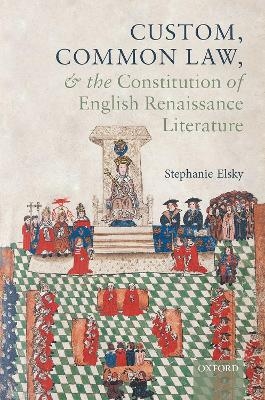
Custom, Common Law, and the Constitution of English Renaissance Literature
Oxford University Press (Verlag)
978-0-19-886143-0 (ISBN)
Custom, Common Law, and the Constitution of English Renaissance Literature argues that, ironically, custom was a supremely generative literary force for a range of Renaissance writers. Custom took on so much power because of its virtual synonymity with English common law, the increasingly dominant legal system that was also foundational to England's constitutionalist politics. The strange temporality assigned to legal custom, that is, its purported existence since 'time immemorial', furnished it with a unique and paradoxical capacity--to make new and foreign forms familiar. This volume shows that during a time when novelty was suspect, even insurrectionary, appeals to the widespread understanding of custom as a legal concept justified a startling array of fictive experiments.
This is the first book to reveal fully the relationship between Renaissance literature and legal custom. It shows how writers were able to reimagine moments of historical and cultural rupture as continuity by appealing to the powerful belief that English legal custom persisted in the face of conquests by foreign powers. Custom, Common Law, and the Constitution of English Renaissance Literature thus challenges scholarly narratives in which Renaissance art breaks with a past it looks back upon longingly and instead argues that the period viewed its literature as imbued with the aura of the past. In this way, through experiments in rhetoric and form, literature unfolds the processes whereby custom gains its formidable and flexible political power. Custom, a key concept of legal and constitutionalist thought, shaped sixteenth-century literature, while this literature, in turn, transformed custom into an evocative mythopoetic.
Stephanie Elsky is Assistant Professor of English at Rhodes College. Her areas of research and teaching include law, politics, and literature; the reception of the classical past; gender; women's writing; and the global Renaissance. She has published essays in English Renaissance Literature, Law Culture and the Humanities, and Spenser Studies, and won the Louis Wilson Round Award for Best Essay in Studies in Philology in 2014. Her research has been supported by the American Council of Learned Societies, the Andrew W. Mellon Foundation, and the Volkswagen Foundation.
Introduction: Custom and Renaissance Literature
1: Time Out of Mind: Custom and the Politics and Poetics of Duration
2: The Commonwealth of Custom in Thomas More's Utopia
3: Inventing Custom: Meter, Etymology, and Conquest in the Spenser-Harvey Letters and Spenser's A View of the Present State of Ireland
4: Performing Custom: Poetry and the Aporia of Constitutional Authorship in Sidney's Old Arcadia
5: Cultivating Custom: The Poetics of the Commonplace in Isabella Whitney's A Sweet Nosgay
6: Forgetting Custom? Narratio, Rebellion, and Revolution in Sir Thomas More and Shakespeare's Hamlet
Conclusion: Custom's Futures
| Erscheinungsdatum | 11.11.2020 |
|---|---|
| Reihe/Serie | Law and Literature |
| Verlagsort | Oxford |
| Sprache | englisch |
| Maße | 165 x 242 mm |
| Gewicht | 520 g |
| Themenwelt | Geisteswissenschaften ► Sprach- / Literaturwissenschaft ► Anglistik / Amerikanistik |
| Geisteswissenschaften ► Sprach- / Literaturwissenschaft ► Literaturwissenschaft | |
| ISBN-10 | 0-19-886143-5 / 0198861435 |
| ISBN-13 | 978-0-19-886143-0 / 9780198861430 |
| Zustand | Neuware |
| Haben Sie eine Frage zum Produkt? |
aus dem Bereich


